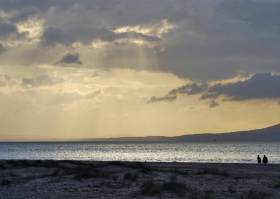Displaying items by tag: Voisinage Arrangement
Minister Seeks To Restore ‘Voisinage Agreement’ To Allow Northern Ireland Vessels To Fish In Irish Inshore Waters
#Fishing - Following a meeting yesterday (Thursday 21 March) with Irish fishing industry leaders from fish producer, processor and inshore organisations, Marine Minister Michael Creed said he will proceed with new legislation to restore the Voisinage Arrangement for reciprocal inshore fishing rights between Ireland and the UK.
Speaking after the meeting, he said: “I wish to thank the Irish fisheries representatives for the positive engagement in today’s consultation pertaining to the progress of the Sea Fisheries Bill 2017, which seeks to restore the longstanding reciprocal ‘voisinage’ (neighbourhood) arrangement with Northern Ireland since the 1960s. Today’s discussions were detailed and considered.
“I now intend to proceed with completing the passage of this legislation as a matter of urgency. This will include an amendment which will ensure that there is no question of preferential treatment for Northern Irish vessels while fishing in the 0-6 nautical mile zone. Access will only be granted on the same terms as are applicable to Irish vessels.
“During the course of the forthcoming debate I also intend to speak to many of the key issues articulated by the industry including concerns regarding the limiting of access to Northern Irish vessels only, and the assurances received from the UK government in terms of the legal reciprocity of the arrangement.”
The Voisinage Arrangement or Agreement has existed since the mid 1960s and allowed for mutual access to vessels from the Republic and Northern Ireland up to six miles off the coast of each country, as previously reported on Afloat.ie.
However, the Republic stopped recognising the arrangement in 2016 after the Supreme Court ruled it had not been properly incorporated in to Irish law. The UK has continued to recognise the agreement for Irish vessels fishing in its waters.
The situation came to a head three weeks ago when two Northern Ireland-registered vessels were detained in Dundalk Bay by the Naval Service for alleged breach of fishing regulations.
British Government Accused Of ‘Coasting’ On Post-Brexit Fisheries Plans For Northern Ireland
#Fishing - The UK Government has been accused of “coasting” on plans for Britain’s and in particular Northern Ireland’s fisheries post-Brexit, as the News Letter reports.
MPs on the Northern Ireland Affairs Select Committee have written to fisheries secretary Michael Gove for solutions to “the crushing shortage of labour, illegal oyster farming in Lough Foyle and Ireland’s continued suspension of fishing rights under the Voisinage Arrangement.”
The Voisinage Arrangement has existed since the mid 1960s and allowed for mutual access to vessels from the Republic and Northern Ireland up to six miles off the coast of each country.
But the arrangements was suspended in the Republic in 2016 after the Supreme Court ruled that it had not been properly incorporated into Irish law.
The committee have also demanded immediate “timescales” to resolve territorial claims on Lough Foyle, which have not been a practical issue since both countries have been EU member states.
The News Letter has more on the story HERE.






























































